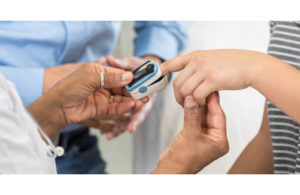
Pulse oximeters have been shown to be less reliable when used on patients with darker skin. (Image from the American Lung Association)
Democratic U.S. senators are prodding the FDA to launch a post-market study of pulse oximeters due to unreliable performance for patients with dark skin.
Pulse oximeters estimate blood oxygen levels (SpO2) and pulse rates in patients using infrared light — usually on a fingertip — at home or in clinical settings. Blood oxygenation is one of the leading vital signs for monitoring and treating COVID patients, but the devices have shown less accuracy for non-white patients than white patients.
RELATED: UCLA prof says racial bias in medical devices like pulse oximeters is based in physics
Citing a need to understand technical improvements that would make the devices more reliable, the lawmakers — Sens. Cory Booker (D-New Jersey), Tammy Duckworth (D-Illinois), Edward Markey (D-Massachusetts), Elizabeth Warren (D-Massachusetts) and Ron Wyden (D-Oregon) — penned a letter to FDA Commissioner Dr. Robert Califf last week.
In it, they followed up on concerns from January 2021 that the unreliability of FDA-cleared pulse oximeters leads to worse health outcomes for non-white people. For example, dangerously low blood oxygen levels in Black patients with COVID might go unnoticed. One recent study found inaccurate measurements meant patients with darker skin received less supplemental oxygen than white patients.
“Black patients were almost 30% and Latino patients were over 20% less likely than white patients to be recognized as eligible for COVID-19 treatments during a pandemic that has disproportionately impacted communities of color and in which Black and Latino patients have a significantly increased mortality risk than their white counterparts,” the senators said in their letter.
The FDA issued a safety communication on pulse oximeters last year and has scheduled a public meeting of the Medical Devices Advisory Committee “to discuss the available evidence about the accuracy of pulse oximeters, recommendations for patients and health care providers, the amount and type of data that should be provided by manufacturers to assess pulse oximeter accuracy, and to guide other regulatory actions as needed.”
Senators seek FDA answers on pulse oximeters
In addition to their request for FDA to initiate a post-market study of pulse oximeters, the senators are seeking information about the agency’s clearance process for the devices.
By Aug. 26, the senators want answers from the FDA about whether the agency has reviewed data on pulse oximeter inaccuracy due to skin pigmentation. They also asked whether the agency collected data on pulse oximeter accuracy for racial and ethnic subgroups when reviewing the devices for clearance.
“Does the FDA plan to adjust accuracy requirements of future pulse oximeters seeking clearance to ensure they are accurate on all patients regardless of skin color?” the senators asked. “If so, are you looking at updating the 510(k) process so devices that have shown bias through peer-reviewed studies or clinical practice may not use the substantial equivalence pathway?”:
The senators also want to know whether there is evidence that other medical devices interact differently with the full range of human skin pigmentation and, if so, how many of those devices are known.